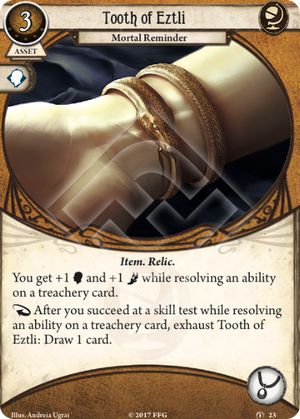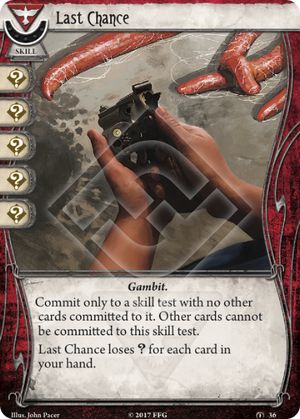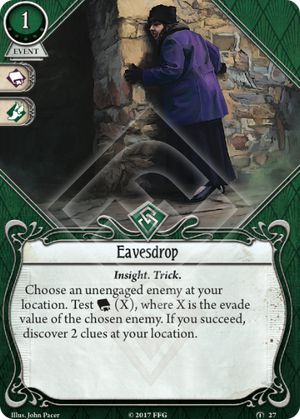
A really interesting card. How many Will or Agility tests can you realistically expect to draw in a given scenario? Well, people have done the math about this. In an excellent post, The Strange Solution calculates that skill tests collectively make up significantly less than half of all encounter cards. Skill tests feature in about 40% of encounter cards in Night of Zealot, 36% in The Dunwich Legacy, and 32% in the Path to Carcosa (the vast majority of these being Willpower or Agility tests, with a handful of Intellect tests thrown in).
This means, if we assume the player is not drawing extra encounter cards (from Delve Too Deep, Overzealous, the exploration deck, etc), the odds are that you will probably not get that many treacheries that involve skill tests. Roughly three to five such treacheries per scenario is a reasonable expectation--and that doesn't leave a lot of room for Tooth of Eztli to turn a big profit. If your scenarios are taking longer or extra encounter draws are a factor, that obviously changes things.
There is the further difficulty that, on high levels, you will often be failing the treachery tests anyway, even with Tooth of Eztli's bonus, and even if further resources are invested. On Expert, even a Higher Education/Hyperawareness/Tooth of Eztli Ursula, which is probably the ideal situation, won't be able to pass all of these tests; and if you fail, obviously, Tooth of Eztli isn't doing much for you. (Although there are a handful of treacheries, like Frozen in Fear, that will almost certainly give you a draw sooner or later.) Daisy and Norman, meanwhile, are going to have a really hard time taking advantage of Tooth of Eztli's draw on Agility checks. On lower levels, where you'll get more draws, and it is just generally a more viable strategy to try to pass treacheries, this card is more attractive.
Generally speaking, Seekers are pretty well positioned to ignore treacheries. The most common outcome of treacheries, by far, is that you take horror; but Seekers can often just ignore this, as they have naturally high Sanity pools (as well as good in-faction horror healing and horror soak if they need it). While Seekers have some nice assets they'd rather not lose, compared to the other four classes, Seekers are the least asset-dependent, and consequently the least afraid of things like Crypt Chill. Frozen in Fear is a terror to Guardians and Rogues; but for a Seeker with Pathfinder in play, it often makes literally no difference.
My instinct is that for solo Seekers, treacheries are generally the least of their worries. Spending a big chunk of resources on a card that provides a small boost against them, and maybe a bit of long-term economy down the road, just doesn't make a lot of sense--not when enemies are such a big threat. For multiplayer Seekers, who don't need to worry about monsters, this is more playable. But I suspect its benefits will end up being substantially less impactful than a lot of other expensive first-turn plays a Seeker could make--and if Tooth of Eztli is delayed past the first turn, it's even less likely to provide profit. Of course, the various synergies related to the Relic keyword (Unearth the Ancients, etc.) complicate things further.




